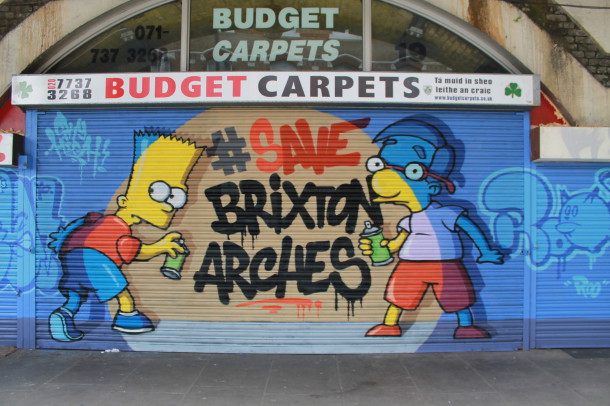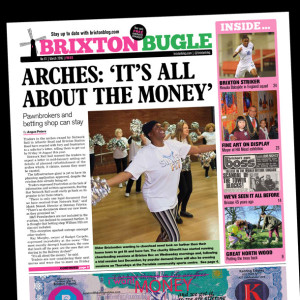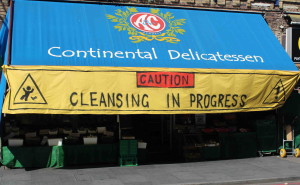
Gentrification is inevitable, remorseless and devoid of conscience – and won’t be stopped by shaming pop-ups, says Nick Buglione
Gentrification. Brixton. Hot topic. Everyone’s fave family-run Portuguese delicatessen closes under the weight of new rents, Brindisa arrives. Chicken Liquor is selling ironic coals to Newcastle, Foxtons agents are the disciples of Satan, house prices have departed the earth’s atmosphere and we’ve been colonised by international bright young things with tattoos, mortgages, hipster beards and disposable incomes. They’re flooding in.
We are at breaking point. Today’s Brixton is the go-to-just-enough-edgy social soft-play ground for a new population of boho south Londoners. If only we could introduce a points-based entry system or have them all encamped on the borders of Stockwell.
Meanwhile, old and slightly bitter Brixton scowls in the shadows muttering gentrification, social cleansing and house-price apartheid at the new bohemians as they obliviously queue up for sourdough pizza, streety-snacks and dirty cocktails.
 Oh the horror. When I was their age, Brixton was a different type of playground that I suspect I remember with distinctly rose-tinted spectacles. All nighters and carrot cake at the (single screen) Ritzy, Soul II Soul’s residency at The Fridge, the hedonistic early golden days of The Dogstar, warehouse raves at CoolTan, Alabama 3 at Mass, the day Mandela came.
Oh the horror. When I was their age, Brixton was a different type of playground that I suspect I remember with distinctly rose-tinted spectacles. All nighters and carrot cake at the (single screen) Ritzy, Soul II Soul’s residency at The Fridge, the hedonistic early golden days of The Dogstar, warehouse raves at CoolTan, Alabama 3 at Mass, the day Mandela came.
But we also had riots, racial tensions, run-down arcades, and the jaunt that is today’s Coldharbour Lane was only undertaken at night with trepidation and/or the desire to be sold oregano.
Brixton was a dark, occasionally desolate, frayed and intimidating place. Which I loved.
Gentrification, technically speaking, is “the buying and renovation of houses and stores in deteriorated urban neighbourhoods by upper or middle income families or individuals, improving property values but often displacing low-income families and small businesses”.
In many ways, that is Brixton’s last decade or so in a nutshell … a slightly messier yellow brick road to one day becoming south London’s Notting Hill (with a dash of Shoreditch).
Whether this is a good thing or (apparently) the end of civilisation is not remotely the point. It is inevitable, remorseless and devoid of conscience. And certainly isn’t going to be halted by curiously devised protests such as “shaming” the bemused proprietors of a champagne and cheese bar by the mass brandishing of Dairylea triangles.
We can’t say we like the Village and having some really good places to eat and drink, but we don’t want chains such as Wahaca. All roads lead to Brindisa and then on to Petit Bateau and Jack Wills.
 Unfortunately we can’t get off the gentrification bus at our own personal stop. Mine would be circa mid to late 90s. A slightly scary five minutes on Reclaim Brixton’s Facebook page reveals a curious cast of people who think they can, for whom the new Brixtonians are a class war issue, for whom every new bar or sea container encased pop-up is a crime against humanity. There are some interestingly engaged people on there, but also a healthy slice of the troll-a-sphere with too much time on their hands.
Unfortunately we can’t get off the gentrification bus at our own personal stop. Mine would be circa mid to late 90s. A slightly scary five minutes on Reclaim Brixton’s Facebook page reveals a curious cast of people who think they can, for whom the new Brixtonians are a class war issue, for whom every new bar or sea container encased pop-up is a crime against humanity. There are some interestingly engaged people on there, but also a healthy slice of the troll-a-sphere with too much time on their hands.
And underneath the arches, it appears a luxurious position to bemoan the death of The Baron or the carpet shop, or the wig shop, while never ever having shopped in them. Doesn’t that just make them cultural window dressing? Without getting all Milton Friedman, sometimes the market decides what lives or dies.
And how many of the processed cheese waving soldiers for social democracy (or their armchair sympathisers) are complaining about their house skyrocketing in value, or that the streets are relatively safer, or that there is more than just Speedy Noodle to eat out in? And what do we do with Mama Lan, Honest and (even) Franco Manca that started out as little poppy-uppy independents, and are now bona fide chains themselves. Disown them?
I’m absolutely all for keeping libraries open, shopping local and making sure the council does its share to give existing businesses a fair chance, but daubing Foxtons’ window with crude slogans and waving Dairylea triangles at a pop-up champagne bar is strategically dubious and obvious, let alone trivial.
I bought a house here as this is the place I grew up in, where I want my children to grow up, and yes, be aware of its history and heritage. And if that is a Brixton without a carpet shop under the arches, I am just going to have to live with it. And if I really wanted to do something about it, I would buy a carpet.
nickbuglione.com







1) I cannot afford these new places. The places I can afford – the cafes in Brixton station road – are going. There is nothing wrong with change. I have seen a lot in my time in Brixton. What is wrong is that Brixton is becoming less affordable for many.
2)The contributor states that this process in “inevitable, remorseless and devoid of conscience”. Is that a good thing? Is that not what many object to? That change is outside any real control. In fact the contributor has ( unwittingly I think) defined the real problem underlying “gentrification”. Except that he is treating it as though its a natural process like a change in the weather. Its not. Its dare I say it a good definition of Capitalism and the effect it has.
The problem is what they Portuguese deli shop or that carpet shop ( that have been serving residents for decades) will be replaced with….another trendy cafe??? Another phone shop? Does Broxton need that??? Or is Brixton made also of the old shops that give it its character???
Well said!
Well-off home owner sitting pretty as house prices soar all around him delivers lecture to locals worrying that the gentrification he dismisses so lightly is going to force them to move away from family and friends.
The very essence of self satisfied hypocrisy. Shameful.
Spot on Nick Buglione – glad you are still flying the flag we so royally and loyally waved Circa (magazine) 95-98. Didn’t we start all this??